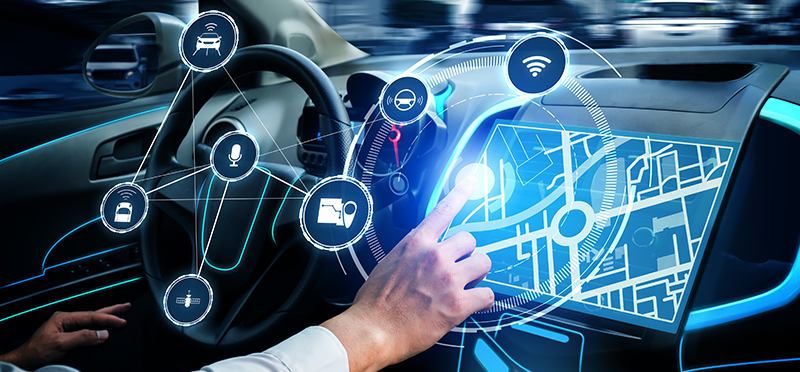
Artificial intelligence (AI) is transforming the automotive industry in ways we never imagined. From self-driving cars to smart maintenance systems, AI is helping automakers build safer, more efficient, and more reliable vehicles. This technology is shaping the future of transportation, making driving experiences more personalized and helping companies improve their manufacturing and customer service operations.
In this guide, we’ll take a deep dive into AI’s role in the automotive industry. We’ll explore how it’s being used today, the benefits it offers, challenges that need to be addressed, and what the future may hold for AI-powered vehicles.
What You’ll Learn in This Guide
- What AI is and how it’s used in the automotive industry
- The biggest benefits of AI for automakers and drivers
- Challenges and ethical concerns about AI in cars
- How AI is shaping the future of self-driving and smart vehicles
- Frequently asked questions about AI in the automotive world
What is AI in the Automotive Industry?
AI in the automotive industry refers to the use of advanced technologies like machine learning, deep learning, and computer vision to improve different aspects of vehicle design, manufacturing, safety, and customer experience. Automakers and tech companies use AI-powered systems to analyze data, predict maintenance needs, assist drivers, and even enable self-driving features.
By using AI, companies are creating smarter cars that adapt to road conditions, learn driver behaviors, and provide real-time assistance to improve overall safety and convenience.
How AI Works in Cars
AI systems in vehicles rely on sensors, cameras, and complex software to process vast amounts of data. These systems can:
- Detect objects and potential hazards on the road
- Provide driving assistance with lane-keeping and braking
- Recognize voice commands for hands-free control
- Analyze driving patterns to offer safety alerts
Now, let’s look at the major ways AI is benefiting the automotive industry.
Benefits and Use Cases of AI in Automotive
1. Improving Manufacturing and Quality Control
AI-powered robotics and automation are making car production more efficient. These smart systems:
- Detect defects in parts before they reach assembly lines
- Improve welding, painting, and assembly precision
- Reduce human error and increase production speed
For example, AI-driven 3D printing speeds up the manufacturing of complex parts, saving time and reducing costs. Predictive maintenance in factories also prevents machine failures, keeping production running smoothly.
2. Enhancing Connected Car Experiences
AI is making cars smarter by creating a more connected driving experience. It powers:
- Personalized infotainment systems that learn your music, navigation, and climate preferences
- Voice-controlled assistants that provide hands-free operation
- Advanced Driver-Assistance Systems (ADAS) that monitor traffic and surroundings to help prevent accidents
With AI, cars are becoming extensions of our digital lives, offering a seamless link between mobile devices, smart home systems, and cloud services.
3. Optimizing Automotive Supply Chains
AI helps automakers streamline their supply chains by:
- Predicting demand for specific vehicle models and parts
- Reducing waste and optimizing inventory levels
- Improving logistics and delivery timing
By analyzing data from weather reports, market trends, and even social media, AI enables companies to make better production and distribution decisions, ultimately reducing costs and improving customer satisfaction.
4. Enhancing Customer Experiences
AI is transforming how customers interact with car manufacturers and dealerships. Here’s how:
- AI-powered chatbots provide instant answers to customer inquiries
- Virtual assistants guide buyers through the car selection and financing process
- Personalized recommendations help customers choose features, accessories, and service plans
With AI, the car-buying and ownership experience is becoming more intuitive and enjoyable.
5. The Future of Self-Driving Cars
One of the most exciting AI applications is autonomous driving. AI enables cars to:
- Make real-time driving decisions based on road conditions
- Navigate complex traffic situations
- Communicate with other vehicles for better traffic flow
As AI technology advances, self-driving cars will become safer and more reliable, reducing accidents and possibly lowering emissions by optimizing fuel efficiency and traffic patterns.
Concerns and Considerations for AI in Automotive
While AI is bringing many benefits to the automotive world, it also raises several concerns. Some key issues include:
1. Cybersecurity Risks
With AI-powered cars relying on vast amounts of data, there’s a risk of hacking. Automakers need to implement strong security measures to prevent cyberattacks that could compromise vehicle safety.
2. Ethical and Legal Questions
Self-driving cars bring up ethical concerns, such as who is responsible if an accident occurs. Automakers, lawmakers, and insurance companies need to establish clear rules on liability and accountability.
3. Data Privacy
AI systems collect a lot of personal data, including driving habits and location history. Companies must ensure that customer data is protected and used responsibly.
4. AI Transparency and Bias
AI models should be transparent and free from bias to ensure fair and safe decision-making. For example, if AI-powered safety systems are trained on limited data, they may not work well for all driving environments.
The Future of AI in Automotive
AI is revolutionizing the automotive industry, and the future looks promising. As technology evolves, we can expect:
- More advanced self-driving cars that improve road safety
- AI-powered traffic management systems to reduce congestion
- Smarter energy-efficient vehicles that adapt to different driving conditions
- Enhanced customer experiences with predictive maintenance and personalized AI assistants
By continuing to innovate and address challenges, AI will shape the future of mobility, making transportation safer, smarter, and more sustainable.
Frequently Asked Questions About AI in Automotive
How can AI help car manufacturers?
AI improves production efficiency, quality control, and predictive maintenance. It also helps design better vehicles by analyzing data on consumer preferences and performance testing.
What role does AI play in self-driving cars?
AI enables self-driving cars to detect obstacles, navigate roads, and make split-second driving decisions. It uses sensors, cameras, and deep learning algorithms to improve safety and efficiency.
How do car dealerships use AI?
Dealerships use AI for customer service, inventory management, and sales optimization. AI-powered chatbots assist customers, while predictive analytics help dealers stock the right vehicles based on demand.
How does AI improve automotive financing?
AI streamlines loan approvals, credit checks, and risk assessments, making auto financing faster and more accessible. It also detects fraud and helps lenders make better loan decisions.
Final Thoughts
AI is driving the next generation of vehicles, from smarter manufacturing to safer driving experiences. As the technology continues to evolve, it will redefine how we interact with cars, making transportation more efficient and enjoyable. While there are challenges to address, the future of AI in automotive is full of exciting possibilities.





